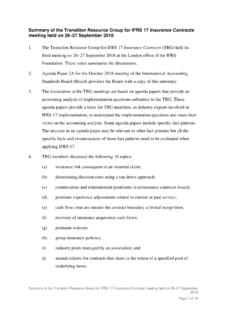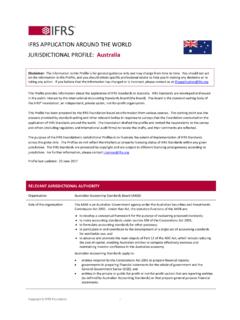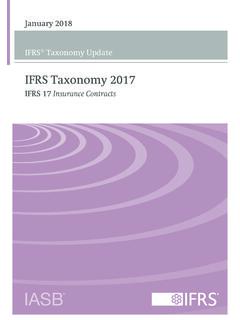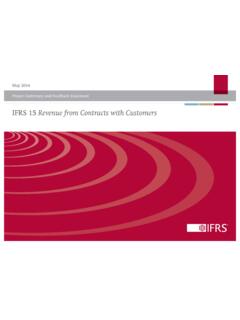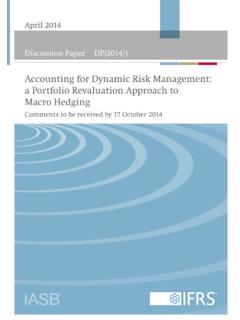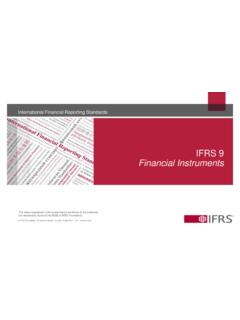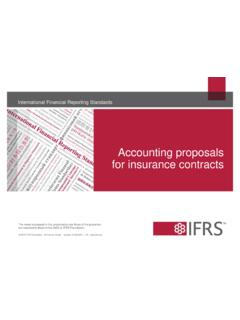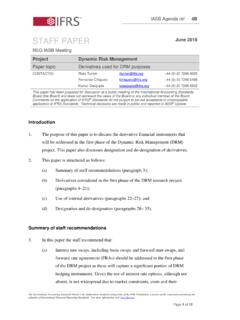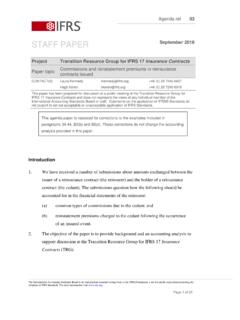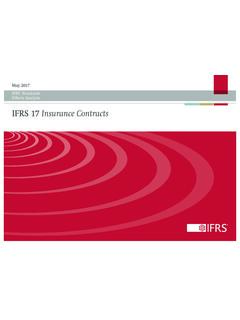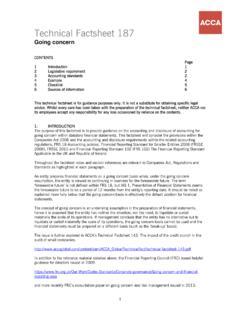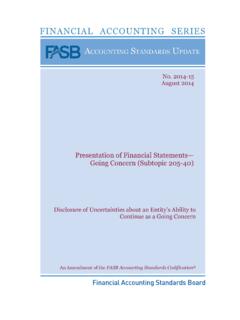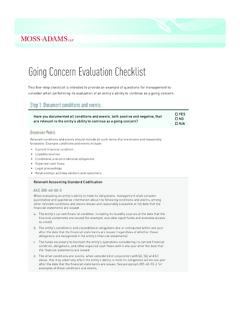Transcription of Going concern—a focus on disclosure - IFRS
1 Going concern a focus on disclosure | January 2021 | 1 January 2021 Going concern a focus on disclosureA fundamental decision management has to make in preparing financial statements applying IFRS Standards is whether to prepare them on a Going concern basis. In the current stressed economic environment arising from the covid-19 pandemic, many entities have seen a significant downturn in their revenue, profitability and hence liquidity which may raise questions about their ability to continue as a Going concern . For such entities deciding whether financial statements are required to be prepared on a Going concern basis may therefore involve a greater degree of judgement than is stakeholders are familiar with the specific discussion of Going concern and related requirements in IAS 1 Presentation of Financial Statements to disclose material uncertainties relating to an entity s ability to continue as a Going concern .
2 However, questions raised about Going concern in recent months have highlighted the relevance of other overarching disclosure requirements in IAS 1 that interact with the specific Going concern requirements. Considering this interaction is an important step in identifying material disclosures required by IFRS Standards; those disclosures are likely to be relevant for users of financial statements. One aspect of this interaction was highlighted in a 2014 Agenda Decision published by the IFRS Interpretations Committee. This document not only recaps the content of that agenda decision but also highlights other possible interactions that might be Going concernWhen preparing financial statements, whether annual or interim, IAS 1 requires management to assess the entity s ability to continue as a Going concern . The Standard defines Going concern by explaining that financial statements are prepared on a Going concern basis unless management either intends to liquidate the entity or to cease trading, or has no realistic alternative but to do document is intended to support the consistent application of requirements in IFRS StandardsParagraph 26 of IAS 1 states that factors that management may need to consider when assessing whether the Going concern basis of preparation is appropriate are those factors that relate to the entity s current and expected profitability, the timing of repayment of existing financing facilities and potential sources of replacement financing.
3 In the current stressed economic environment, an entity may be affected by a wider range of factors than in the past. IAS 1 requires management to take into account all available information about the future. Therefore, management may need to consider this wider range of factors before it can conclude whether preparing financial statements on a Going concern basis is appropriate. For instance, among the factors management may need to consider are the effects of any temporary shut-down or curtailment of the entity s activities, possible restrictions on activities that might be imposed by governments in the future, the continuing availability of any government support and the effects of longer-term structural changes in the market (such as changes in customer behaviour).When assessing whether to prepare financial statements on a Going concern basis, IAS 1 requires management to look out at least 12 months from the end of the reporting period but emphasises that the outlook is not limited to 12 months.
4 Some national regulations require consideration of Going concern for 12 months from the date that financial statements are authorised for issue. Considering time periods longer than 12 months is not inconsistent with the requirements in IAS 1, which establishes a minimum period, not a concern a focus on disclosure | January 2021 | 2A dynamic assessmentCircumstances affecting management s assessment of the entity s ability to continue as a Going concern might change rapidly in the current environment. Paragraph 14 of IAS 10 Events after the Reporting Period explains that management s assessment of the use of a Going concern basis of preparation needs to reflect the effect of events occurring after the end of the reporting period up to the date that the financial statements are authorised for issue. This might require management to update assessments of the Going concern basis of preparation and decisions about which disclosures are necessary.
5 If, before the financial statements are authorised for issue, circumstances were to deteriorate so that management no longer has any realistic alternative but to cease trading, the financial statements must not be prepared on a Going concern is keyWhether or not to prepare financial statements on a Going concern basis is a binary decision, but the circumstances in which entities prepare financial statements on a Going concern basis will vary circumstances could range from when an entity is profitable and has no liquidity concerns to when it is a close call to prepare the financial statements on a Going concern basis, even after considering any mitigating actions planned by management. Management s decision will be underpinned by assumptions and judgements that, in the current environment, may involve more uncertainty than in the past. It is important therefore that an entity considers not only the specific disclosure requirements relating to Going concern in paragraph 25 of IAS 1 but also the overarching disclosure requirements in IAS 1.
6 These requirements include those in paragraph 122 relating to judgements that have the most significant effect on the amounts recognised in the financial statements. In the current stressed economic environment, users of financial statements are more likely to focus on disclosures relating to Going concern . Questions that users might ask could include how the assumptions management has used in reaching its conclusion about Going concern relate to assumptions underpinning other aspects of the financial statements. entity situation deteriorating ..Basis of preparationNo specific disclosuresBasis of preparationSignificant judgements?Basis of preparationMaterial uncertaintiesSignificant judgements?Limited specific requirementsScenario No significant doubts about Going concern Significant doubts about Going concern but mitigating actions judged sufficient to make Going concern appropriateEntity determines no material uncertainties Significant doubts about Going concern but mitigating actions judged sufficient to make Going concern appropriateMaterial uncertainties about Going concern remain after considering mitigating actions Intends to liquidate or to cease trading, or no realistic alternative but to do soBasis of preparationGoing concernAlternate basis (not Going concern )Applying the requirements in IAS 1 The requirements in IAS 1 can be depicted as set out in the diagram below: Going concern a focus on disclosure | January 2021 | 3 Applying the requirements in IAS 1 continued.
7 At one end of the Going concern range, in Scenario 1, is an entity that has profitable operations and has no liquidity concerns and for which there are no significant doubts about its ability to continue as a Going concern . For such an entity , apart from the need to describe the basis of preparation, there are no specific disclosure requirements relating to Going concern . It is also less likely that significant judgements were involved in reaching the conclusion to prepare the financial statements on a Going concern the other end of the Going concern range, in Scenario 3, is an entity that is close to ceasing to be a Going concern . Assume the entity is loss-making, demand for its goods or services has decreased rapidly and its funding facilities are due to expire in the next 12 months. In this scenario, management has concluded after considering all relevant information including the feasibility and effectiveness of the actions it plans to take that preparing the financial statements on a Going concern basis is appropriate.
8 Nonetheless, management concludes there are material uncertainties relating to events or conditions that may cast significant doubt upon the entity s ability to continue as a Going concern for example, there might be considerable uncertainty about management s ability to execute its turnaround strategy to address the reduced demand and to renew or replace funding. In such a scenario paragraph 25 of IAS 1 requires an entity to disclose the material uncertainties relating to its ability to continue as a Going concern . In doing so, the entity identifies that those uncertainties may cast significant doubt upon its ability to continue as a Going Scenario 3, the conclusion to prepare the financial statements on a Going concern basis is likely to have involved significant judgement. If this is the case, in addition to disclosing the material uncertainties as required by paragraph 25, the entity is also required to apply the disclosure requirements in paragraph 122 relating to the judgement that the Going concern basis is appropriate.
9 In applying these requirements, the entity considers what information is material about (a) the events or conditions that cast significant doubt upon the entity s ability to continue as a Going concern and (b) the feasibility and effectiveness of management s actions or plans in response to those events or consider Scenario 2. Assume that the facts are similar to Scenario 3 except that after considering the feasibility and effectiveness of the actions it plans, management concludes that the material uncertainties are expected to be mitigated for example, management might have started executing a turnaround strategy that is showing sufficient evidence of success including identifying feasible alternative sources of financing. The Interpretations Committee considered a similar scenario in 2014. In its Agenda Decision the Committee highlights that if, after considering planned mitigating actions, management s conclusion that there are no material uncertainties involves significant judgement, then the disclosure requirements in paragraph 122 would apply to the judgements made in concluding that no material uncertainties example of overarching disclosure requirements in IAS 1 that could also be relevant, especially in cases of close calls, are the requirements relating to sources of estimation uncertainty in paragraphs 125 133.
10 These paragraphs require an entity to disclose information about the assumptions it makes about the future, and other major sources of estimation uncertainty at the end of the reporting period, that have a significant risk of resulting in a material adjustment to the carrying amounts of assets and liabilities within the next financial concern a focus on disclosure | January 2021 | 4 What is an entity required to do if it is not a Going concern ?Consider Scenario 4 and an entity that is no longer a Going concern . IAS 1 explains that the Going concern basis of preparation is no longer appropriate when management either intends to liquidate the entity or to cease trading, or has no realistic alternative but to do so. In such cases, if the entity prepares financial statements applying IFRS Standards, it does not prepare them on a Going concern 1 does not specify an alternate basis for preparing financial statements if the entity is no longer a Going concern .
